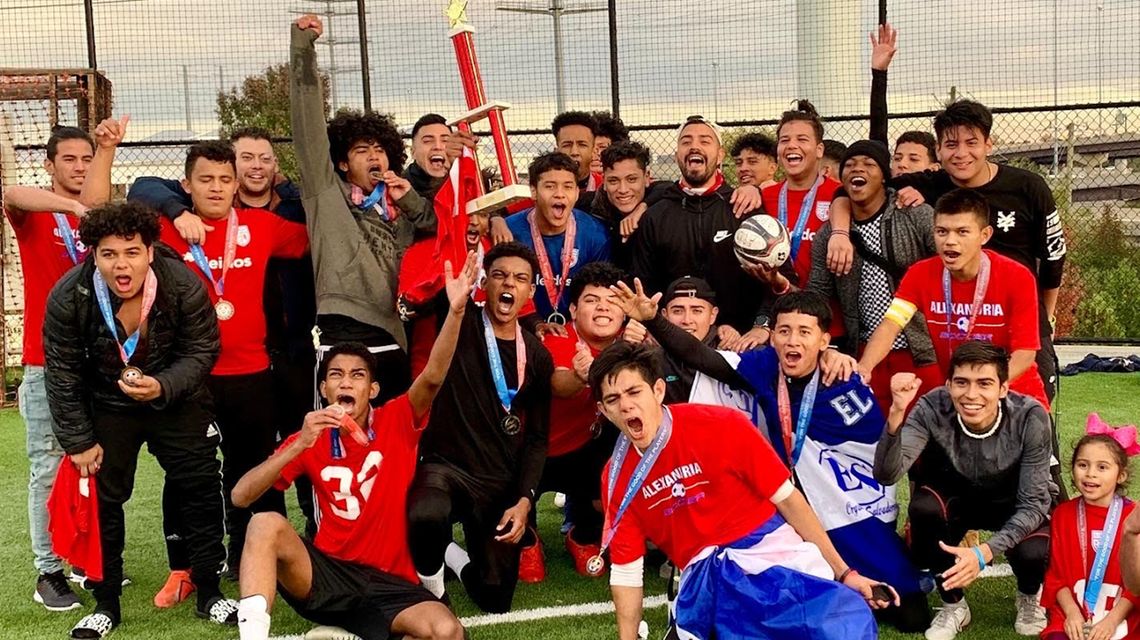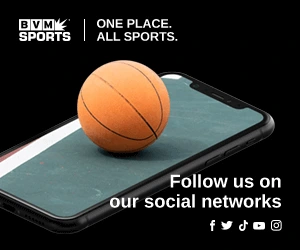
Sirens, selflessness and soccer: How two resource officers connected cultures through sport
ALEXANDRIA, Va. (BVM) — Gary Argueta and Johnny Larios noticed a problem at T.C. Williams High School. The pair, working together as school resource officers, could tell there was a clear disconnect between their work within the school and the students that they were trying to help.
“You get really good at reading body language with this job, so I would be walking down the hall and you could just tell the kids weren’t really into seeing a police officer around,” Larios said. “I also had a bunch of cases early on where nobody would talk to me. They wouldn’t say anything.”
Even more difficult was connecting with members of the school’s International Academy, a special program designed to help recent immigrants, many of whom struggled with language barriers and immersing themselves into the new environment. Also difficult was adjusting to the new authority at the school as many international students came from areas where they were leery of law enforcement.
“It was more like a fear (from the international students),” Larios said. “I think that is kind of like because in their countries in Latin America, a lot of the police are pretty corrupt so it was pretty evident early on.”
“They didn’t really want to come to us or me about their problems,” Argueta said. “They thought we weren’t there to help them. I had the feeling they thought we were just there to catch them doing something bad so they really didn’t want to come up to us to talk about other things going on in their lives.”
The officers understood some of the difficulties the students were experiencing. Larios, whose parents and sister emigrated to the U.S. from Mexico, had witnessed firsthand the struggles of being an immigrant in a new country. Agueta also knew how difficult the new environment is to immigrants being a second generation American of Guatemalan descent. With a high population of Latino students to go along with the International Academy, the duo discovered the one connecting point they could give to help improve the relationship of all members of the school: soccer.
“(Soccer is) Latin America’s No. 1 sport and it’s me and Gary’s favorite sport as well,” Larios said. “Gary had a conversation with an administrator who told him there was an after school program they used to have where they’d kick a soccer ball around with some girls in the International Academy. That’s when we had the idea let’s do that, but why not make it bigger and make it a club team?”
With a soccer ball in hand, the pair began to advertise the team throughout the school. Using mainly word of mouth, signs in the school and referrals of at-risk students interested in soccer from the school’s social worker, the coaches were slowly able to develop the semblance of a team. The pair could tell the interest in the program from all different people in the school was there from the first meeting.
“The interest meeting was packed,” Larios said. “It was kind of funny because there were a bunch of different kinds of groups of people from all over the world in that room so it was pretty fun.”
But starting a new program wasn’t easy. Students struggled enough with school and some even had to work to help support their family to even think about playing a sport. During the first year, the officers struggled to find a place for students to be able to practice, settling with an overgrown and unused field behind the school for its outdoor season and a nearby church for its indoor practices.
“I remember it was rough,” Argueta said. “We didn’t really have equipment. We barely had balls. I don’t know where we got the balls from. It wasn’t that great of a field, but it was something. I remember we would put backpacks down as goals and we would just scrimmage. Right now, we have come a long way and I am grateful for it.”
The pair had difficulties being able to transport students as well, many times forced to use their department’s police van and other resources, when they did find a place to go. Harder still was not only managing a room full of young students, but also learning how to coach the sport itself.
“Looking back it’s pretty funny, but at the time it was pretty stressful,” Larios said. “We had no idea what we were doing to be honest with you. We were kind of winging it, faking it until we made it. But we couldn’t let the kids know that. You could put me in a room with a bunch of disorderly citizens right now and I could probably handle them, but you put me in a room with 20 teenagers and a couple soccer balls, good luck. It was crazy.”
But this did not deter Argueta or Larios.
The duo created the Athletico soccer program, a club program for the Alexandria Soccer League. Slowly but surely, the players began to open up. Disagreements happened less, players understood each other more even if the language barrier was still there and the team began stringing together better practices and games. Not only was the play on the field improving, but so was the communication between student and officer as well as between student and student.
“A couple of weeks in, we saw them starting to let their guards down and start to joke around with us more,” Larios said. “It eventually evolved into looking at us more as big brothers than as police officers so it didn’t take long to be honest.”
One of the biggest challenges for both officers was the intermixing of cultures, many of which had a long-standing distrust of one another. Two groups of kids on the first squad didn’t particularly enjoy each other, one group being Middle Eastern and the others being Latino. The two groups prior to the formation of the team even had an altercation in the hallway, but by the end of the season, the officers saw more fist bumps and high fives from their players in the halls of T.C. Williams.
“After the soccer season, I saw them shaking each other’s hands saying, ‘What’s up man? How have you been?’ and dapping each other up like they were buddies,” Argueta said. “Not too long ago they were having an altercation in the hallway so that’s when I really saw what we were doing was actually making a difference.”
As the team found success on the field, winning the league’s Division II title in its first year, they became closer because of it, trusting officers with some serious issues. Both officers were invited to and attended the memorial service of a player’s family member who had died due to gun violence. When a player lost his father prior to the team’s championship game, the team rallied around him, giving him a much-needed escape from reality.
“We all did a card for him and we had a moment where we circled around him before the game. It was a really touching moment,” Larios said. “He played a hell of a game and we ended up winning that game. I could see just how happy he was and how happy everyone was after and I know for at least 90 minutes he forgot about what was going on. That’s when I initially knew this is something special we are doing here.”
The two officers feel the team is not only improving relationships in the school, but also improving the students’ lives as a whole. Many of the team’s participants were not given the opportunity to participate in a high school sport due to either financial or social restraints, but now can play as a member of Athletico. Many players also didn’t have a parental figure to open up to or trust, now they have two. Players who found themselves in dangerous environments or at risk of falling into the wrong crowd, now spend their time after school with the team. The team is slowly fulfilling everything the officers set out to do in the first place.
“Us as a team, we have slowly become like a family,” Larios said. “I know our last season, we all got in a huge circle together and we all had a chance to each tell something that was going on in our lives. These kids have been through a lot, they have all come from tough backgrounds and they have a lot of trauma. It got real emotional, but it definitely bonded us. I knew that was special. I knew, not only were we playing soccer, but it was an avenue to let out what’s going on in their lives.”
Currently, the program has two outdoor teams and four futsal (indoor) teams with over 60 players total from at least 10 different countries. The team also speaks a number of different languages including English, Spanish and Arabic among others.
The process is still an ongoing one for Athletico. Much of the team’s survival is dependent on the grant money from the Alexandria Police Foundation, Alexandria Soccer Association and volunteers. The program is completely free for players, with the exception that players bring their own water, as the coaches want students to have as much opportunity to participate as possible.
“We would like it to be bigger, but we can’t,” Argueta said.
“We could have 100 (kids), our problem is we just don’t have enough resources,” Larios said.
Though maintaining the team is an ongoing battle, the team has been able to find success early in its founding.
After winning its first championship in 2015, Athletico’s inaugural season, the team was moved up to Division I for the league and, although they had regular season success, fell short of the championship in back-to-back seasons. Following a particularly grueling summer of soccer boot camp, the team came out red hot and prepared for their season last year. In the fall, the U19 went undefeated with only one game ending in a tie. The team ended up winning the league’s Division I championship, 3-0, marking their first championship at that level.
“It was amazing,” Larios said. “It was the first season where everything connected. Discipline, we had the right kids who really wanted it. The stars aligned basically.”
“It was a picture perfect season,” Argueta said. “I feel like the kids deserve all the credit, they put in all the hard work.”
The coaches hope the success helps to lure in the eyes of recruiters, giving some of the struggling students an opportunity to go to college. Although it would be a difficult road for many students to even get looks from colleges, with those programs preferring to look at travel or elite squads, the coaches are still hopeful for their students’ futures.

“I would like our team to eventually merge and create an elite team that goes out and plays travel against other teams because I know we have the potential to do that,” Argueta said. “Just compete at a higher level and have colleges look at our kids or even have our kids going to college showcase tournaments I know they do around here locally. My ultimate goal for the future is our program becomes a breeding ground or a hub for college coaches to come here, look at our kids and recruit them.”
The program still struggles with transportation, but were fortunate enough to be given a better practice space for the outdoor season from the Alexandria Soccer Association and are able to use a nearby middle school gym for its futsal practices. The coaches are also looking for more volunteers, although the duo added two more coaches, they still feel the more help they can get, the better the experience will be for the kids.
“It’s been hard transporting two teams especially because sometimes their games don’t follow each other,” Argueta said. “One team will have a game 30 minutes away at a different time and then the other team will have a different game and they’d overlap. I would say volunteers in the future because this was the first year we had to make cuts for the indoor season and I really don’t like saying no to a kid, especially if this is free.”
Funding is also still difficult. The program raised $20,000 in grant money, but in the first year, had already used $10,000.
“It’s going to go fast, so I am a bit worried it may dry up. That’s my main concern,” Larios said.
For their efforts with the team, both Argueta and Larios were honored at a luncheon by the Optimist Club of Alexandria for their work in mentoring the T.C. students.
“Me and Gary honestly didn’t think anyone was noticing what we were doing nor were we doing it for that, but we didn’t even think our superiors, other than our sergeant, knew what was going on so when we heard that we were really shocked,” Larios said. “Of course it feels good to be recognized for it. I know it only helps our program be recognized for it so it’s a good feeling for me.”
In November of last year, T.C. Williams hosted its “Cops vs. Kids” soccer event to continue to improve the relationship between the school’s students and local law enforcement. The brainchild of Argueta, Cops vs. Kids is a futsal tournament that saw students play against each other as well as the officers. The tournament was a community event with an ice cream truck provided by the police department, the Alexandria Soccer Association brought out a tent for the event and first place winners were given a $100 gift card.
“It was a chance for the kids to also see other cops out there, playing against them and having fun,” Argueta said. “So they shouldn’t be scared of talking to cops, we’re not here to get them in trouble. I had fun playing.”
“It was our chance to connect with the kids that aren’t in our soccer program,” Larios said. “We have a close connection with the rest of the students, but we never had a way to integrate with them so this was a way to play them and have fun with them.”
At the forefront of the event’s promotional video were Argueta and Larios, performing goofy police stunts to the Beastie Boys song “Sabotage.” The pair’s fun-loving and caring nature clearly jumps off the screen and it makes one wonder if the soccer team may have helped the duo in a way too.






